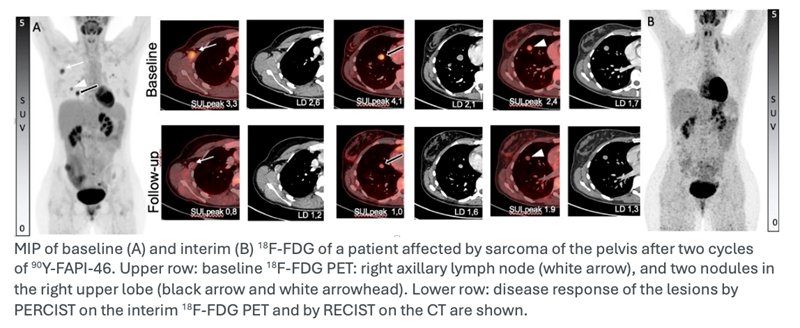FAP-Targeted Therapy Shows Significant Efficacy Controlling Advanced Sarcomas
 Fibroblast activation protein (FAP)-targeted radioligand therapy is safe and effective for treating patients with progressive metastatic tumors, particularly advanced sarcomas, according to research presented at the 2024 Society of Nuclear Medicine and Molecular Imaging Annual Meeting. Studying the largest cohort to date, researchers found that 90Y-FAPI-46 radioligand therapy controlled disease progression in nearly half of the patients in the study, almost exclusively for those with advanced sarcoma.
Fibroblast activation protein (FAP)-targeted radioligand therapy is safe and effective for treating patients with progressive metastatic tumors, particularly advanced sarcomas, according to research presented at the 2024 Society of Nuclear Medicine and Molecular Imaging Annual Meeting. Studying the largest cohort to date, researchers found that 90Y-FAPI-46 radioligand therapy controlled disease progression in nearly half of the patients in the study, almost exclusively for those with advanced sarcoma.
FAP is highly expressed on cancer associated fibroblasts of several malignant solid tumors and sarcoma entities. As such, FAP represents a promising theranostic target for radioligand imaging and therapy.
“FAP-targeted radioligand therapy represents a groundbreaking approach in cancer treatment. Its ability to selectively target electively to FAP-expressing cells and deliver localized radiation, minimizing off-target effects, has the potential to offer significant advantages over traditional therapies,” said Helena Lanzafame, MD, researcher in the Department of Nuclear Medicine at University Hospital Essen in Essen, Germany.
The study included 30 patients with sarcoma, advanced metastatic cancers of the pancreas, prostate cancer, gastric cancer, squamous cell carcinoma, or cholangiocarcinoma who received a total of 77 cycles of 90Y-FAPI-46 therapy between June 2020 and December 2023. After treatment, adverse events of any grade were documented, and imaging response was assessed by RECIST or PERCIST guidelines.
90Y-FAPI-46 radioligand therapy was well tolerated by patients and critical organ radiation dose levels were not reached during treatment. Imaging control of disease by RECIST was obtained in 44 percent of patients, among which 35 percent had sarcoma. A PERCIST response was noted in 55 percent of patients.
“The results of our study have demonstrated good tolerance and promising efficacy, particularly in controlling disease progression in patients with advanced sarcoma,” stated Lanzafame. “This indicates a specific benefit for this patient group, who often have limited treatment options due to the aggressive nature and poor prognosis associated with metastatic stage disease. 90Y-FAPI-46 radioligand therapy represents a promising approach for these patients, potentially improving survival rates and quality of life.”